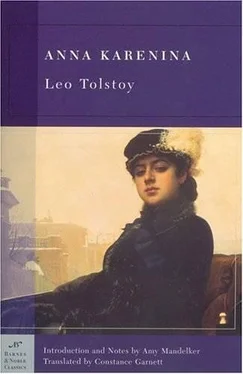Leo Tolstoy - Anna Karenina
Здесь есть возможность читать онлайн «Leo Tolstoy - Anna Karenina» весь текст электронной книги совершенно бесплатно (целиком полную версию без сокращений). В некоторых случаях можно слушать аудио, скачать через торрент в формате fb2 и присутствует краткое содержание. Жанр: Классическая проза, на английском языке. Описание произведения, (предисловие) а так же отзывы посетителей доступны на портале библиотеки ЛибКат.
- Название:Anna Karenina
- Автор:
- Жанр:
- Год:неизвестен
- ISBN:нет данных
- Рейтинг книги:4 / 5. Голосов: 1
-
Избранное:Добавить в избранное
- Отзывы:
-
Ваша оценка:
- 80
- 1
- 2
- 3
- 4
- 5
Anna Karenina: краткое содержание, описание и аннотация
Предлагаем к чтению аннотацию, описание, краткое содержание или предисловие (зависит от того, что написал сам автор книги «Anna Karenina»). Если вы не нашли необходимую информацию о книге — напишите в комментариях, мы постараемся отыскать её.
Anna Karenina — читать онлайн бесплатно полную книгу (весь текст) целиком
Ниже представлен текст книги, разбитый по страницам. Система сохранения места последней прочитанной страницы, позволяет с удобством читать онлайн бесплатно книгу «Anna Karenina», без необходимости каждый раз заново искать на чём Вы остановились. Поставьте закладку, и сможете в любой момент перейти на страницу, на которой закончили чтение.
Интервал:
Закладка:
"Here you are at last!" she observed, extending her hand to him.
He kissed her hand and sat down beside her.
"All in all, I can see your trip was a success," he said to her.
"Yes, very much so," said she, and she began telling him everything from the beginning: her journey with Countess Vronskaia, her arrival, the accident at the station. Then she described the pity she had felt, first for her brother, and, afterward, for Dolly.
"I do not suppose there is any excuse for such a man, even though he is your brother," said Alexei Alexandrovich sternly.
Anna smiled. She knew that he said this precisely to show that family considerations could not prevent him from expressing his sincere opinion. She knew this trait in her husband and liked it.
"I am glad everything has ended so well, and that you have returned," he went on. "Well, and what do they say there about the new bill I have got passed in the Council?"
Anna had heard nothing of this bill, and she felt conscience-stricken that she could so readily forget what was to him of such importance.
"Here, on the other hand, this has created a great deal of talk," said he, with a self-satisfied smile.
She saw that Alexei Alexandrovich wanted to tell her something that pleased him about it, and she brought him by questions to telling it. With the same self-satisfied smile he told her of the ovations he had received as a consequence of the bill he had passed.
"I was very, very happy. It shows that at last an intelligent and firm view of the matter is forming among us."
After his second cup of tea, with cream and bread, Alexei Alexandrovich got up, and went toward his study.
"And you went nowhere this evening? Weren't You really bored?" he said.
"Oh, no!" she answered, getting up after him and accompanying him across the room to his study. "What are you reading now?" she asked.
"Just now I'm reading Duc de Lille- Poisie des enfers," he answered. "A most remarkable book."
Anna smiled, as people smile at the weaknesses of those they love, and, putting her hand in his, she kept him company to the door of his study. She knew his habit, now become a necessity, of reading in the evening. She knew, too, that in spite of his official duties, which engrossed almost all his time, he deemed it his duty to keep up with everything of note that appeared in the intellectual sphere. She knew, too, that his actual interest lay in books dealing with politics, philosophy and theology, that art was utterly foreign to his nature; but, in spite of this- or rather, in consequence of it- Alexei Alexandrovich never missed anything which created a sensation in the world of art, but made it his duty to read everything. She knew that in politics, in philosophy, in theology, Alexei Alexandrovich was a doubter and a seeker; yet in matters of art and poetry- and, above all, of music, of which he was totally devoid of understanding- he had the most definite and decided opinions. He was fond of discoursing on Shakespeare, Raphael, Beethoven, on the significance of new schools of poetry and music, all of which were classified by him with most obvious consistency.
"Well, God be with you," she said at the door of the study, where a shaded candle and a decanter of water were already placed near his armchair. "As for me, I'm going to write to Moscow."
He squeezed her hand, and again kissed it.
"Still, he's a good man; truthful, kindhearted, and remarkable in his own sphere," Anna said to herself, back in her room, as though defending him before someone who accused him, saying that one could not love him. "But why is it his ears stick out so queerly? Or has he had his hair cut?…"
Exactly at twelve, as Anna was still sitting at her desk finishing a letter to Dolly, she heard the sound of measured, slippered steps, and Alexei Alexandrovich, washed and combed, a book under his arm, approached her.
"Come, come," said he, with a particular smile, and passed on into their bedroom.
"And what right had he to look at him like that?" reflected Anna, recalling how Vronsky had looked at Alexei Alexandrovich.
Having disrobed, she went into the bedroom; but her face had none of the animation which, during her stay at Moscow, had fairly spurted from her eyes and her smile; on the contrary, now the fire seemed extinct in her, or hidden somewhere far away.
XXXIV
Upon his departure from Peterburg Vronsky had left his large apartments on Morskaia to his friend and favorite comrade Petritsky.
Petritsky was a young lieutenant, not particularly well-connected, and not merely not wealthy, but in debt all around. Toward evening he was always drunk, and he had often found himself in the guardhouse because of sorts of ludicrous and disgraceful scrapes, but he was a favorite both of his comrades and his superior officers. At twelve o'clock, as Vronsky was driving up from the station to his quarters, he saw, near the entrance of the house, a hired carriage familiar to him. Even as he rang he heard, beyond the door, masculine laughter, the twitter of a feminine voice, and Petritsky's shout: "If that's one of the villains, don't let him in!" Vronsky told the servant not to announce him, and slipped noiselessly into the first room. Baroness Shilton, a friend of Petritsky's, with a rosy little face and flaxen-fair, resplendent in a lilac satin gown, and filling the whole room, like a canary, with her Parisian accents, sat at a round table, brewing coffee. Petritsky, in his overcoat, and the cavalry captain Kamerovsky, in full uniform, probably just come from duty, were sitting near her.
"Bravo! Vronsky!" shouted Petritsky, jumping up, scraping his chair. "Our host himself! Baroness, some coffee for him out of the new coffeepot. There, we didn't expect you! I Hope you're satisfied with the adornment of your study," he said, indicating the Baroness. "You know each other, of course?"
"I should say so!" said Vronsky, with a bright smile, squeezing the Baroness's little hand. "Why, we're old friends."
"You've just returned after traveling," said the Baroness, "so I'll run along. Oh, I'll be off this minute, if I'm in the way!"
"You're home, wherever you are, Baroness," said Vronsky. "How do you do, Kamerovsky?" he added, coldly shaking hands with Kamerovsky.
"There, you can never say such charming things," said the Baroness, turning to Petritsky.
"No- why not? After dinner even I can say things quite as good."
"After dinner there's no merit in them! Well, then, I'll give you some coffee; go wash and tidy up," said the Baroness, sitting down again, and anxiously turning a gadget in the new coffee urn. "Pierre, give me the coffee," she said, addressing Petritsky, whom she called Pierre, playing on his surname, making no secret of her relations with him. "I want to put some more in."
"You'll spoil it!"
"No, I won't spoil it! Well, and how is your wife?" said the Baroness suddenly, interrupting Vronsky's conversation with his comrade. "We've been marrying you off here. Have you brought your wife along?"
"No, Baroness. I was born a gypsy, and a gypsy I'll die."
"So much the better- so much the better. Shake hands on it."
And the Baroness, detaining Vronsky, began telling him, interspersing her story with many jokes, about her latest plans of life, and seeking his counsel.
"He persists in refusing to give me a divorce! Well, what am I to do?" (He was her husband.) "Now I want to begin a suit against him. What would you advise? Kamerovsky, look after the coffee- it's boiled out; you can see I'm taken up with business! I want a lawsuit, because I must have my property. You can understand the stupidity of his saying that I am unfaithful to him," she said contemptuously, "yet through it he wants to get the benefit of my fortune."
Vronsky heard with pleasure this lighthearted prattle of a pretty woman, said yes to everything, gave her half-joking counsel, and altogether dropped at once into the tone habitual to him in talking to such women. In his Peterburg world all people were divided into two utterly opposed kinds. One, the lower, consisted of vulgar, stupid and, above all, ridiculous people, who believe that one husband ought to live with the one wife whom he has lawfully wedded; that a girl should be innocent, a woman modest, and a man manly, self-controlled, and strong; that one ought to bring up one's children, earn one's bread and pay one's debts; and various similar absurdities. Those people were of an old-fashioned and ridiculous kind. But there was another kind of people- real people, to which they all belonged, and here the chief thing was to be elegant, magnanimous, daring, gay, and to abandon oneself without a blush to every passion, and to laugh at everything else.
Читать дальшеИнтервал:
Закладка:
Похожие книги на «Anna Karenina»
Представляем Вашему вниманию похожие книги на «Anna Karenina» списком для выбора. Мы отобрали схожую по названию и смыслу литературу в надежде предоставить читателям больше вариантов отыскать новые, интересные, ещё непрочитанные произведения.
Обсуждение, отзывы о книге «Anna Karenina» и просто собственные мнения читателей. Оставьте ваши комментарии, напишите, что Вы думаете о произведении, его смысле или главных героях. Укажите что конкретно понравилось, а что нет, и почему Вы так считаете.












